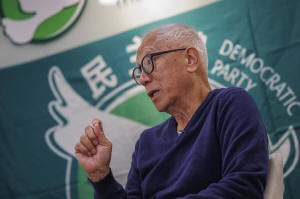Hong Kong's biggest pro-democracy party moves to disband as freedoms
dwindle
[April 12, 2025]
By KANIS LEUNG
HONG KONG (AP) — When Yeung Sum co-founded the city's largest
pro-democracy party more than 30 years ago, he knew building a
democratic Hong Kong would be a “difficult dream." Still, it was not
impossible.
Today, his Democratic Party is moving toward dissolution, a symbolic
marker of the diminishing Western-style civil liberties and high degree
of autonomy that the ruling Communist Party in Beijing promised to keep
intact in the former British colony for at least 50 years when it
returned to China in 1997.
Pro-democracy protests that paralyzed Hong Kong in 2019 led to a
crackdown that has all but silenced dissent through restricted
elections, media censorship and a China-imposed national security law
that saw some of Yeung's party members jailed. Dozens of civil society
groups closed down.
Former chairperson Yeung said in an interview with The Associated Press
that Chinese officials told him the party needed to disband. He urged
his members to support the motion to give the leadership mandate to
handle the process.
“I’m not very happy about it," said Yeung. “But I can see if we refuse
the call to disband, we may pay a very huge price for it.”
Others received similar messages. Party veteran Fred Li said Chinese
officials implied the party wouldn’t survive through this year’s
legislative election when he asked about the possibility of its members
running. Another founding member, Sin Chung-kai, said some Hong
Kong-based members were warned in early February of consequences if the
party continued to exist.
Promising early years
The Democratic Party was formed in 1994 through a merger of two
pro-democracy groups. According to its manifesto, it supports Hong
Kong’s return to China.
In its early years, it won the most seats in the legislative council.
Before Beijing changed electoral rules in 2021 to ensure only “patriots”
can run, the party was a major pro-democracy voice in the legislature
even after it no longer held the largest number of seats. Back then,
Yeung said, the pro-democracy camp generally won about 60% of the
popular vote.
Yeung was encouraged to see that the experiment in democracy, the rule
of law, an independent judiciary and a merit-based administration could
work in the city.
“The entire social system has been demonstrated to be quite, quite,
quite promising over the years,” he recalled.
Negotiations with Beijing drew backlash
In 2010, the party came under fire after it supported the government’s
political reform package in negotiations with Chinese officials that
allowed millions of voters to directly elect five lawmakers from their
district councils. Some members who hoped for broader democratic reform
quit in protest and the party lost two seats in the 2012 legislative
election. It also drew backlash from advocates within the pro-democracy
camp.

Looking back, former chairperson Emily Lau, who was involved in the
talks with Beijing, insists many people supported the outcome because it
was a step forward. She said they asked Beijing to continue to have
dialogue with others to find a way for universal suffrage, but it never
did.
“Maybe the only thing I would have done a bit differently is not to go
into the (Beijing's) liaison office (in Hong Kong). I guess we
underestimated how many Hong Kong people hated them,” she said.
As new pro-democracy groups were on the rise, the party’s influence
dwindled. That became more obvious after the emergence of younger
politicians, including pro-Hong Kong independence activists, following
the 2014 massive protests calling for universal suffrage. Still, five
years later, when the 2019 protests swept Hong Kong, the party's
activism won widespread support once again.
[to top of second column]
|

Yeung Sum, the founding member of the Democratic Party, speaks
during an interview at the Democratic Party's office in Prince
Edward in Hong Kong on April 2, 2025. (AP Photo/May James)

After crackdown
China's crackdown including the 2020 sweeping security law changed
the political landscape. Some former lawmakers, including party
ex-chairmen Albert Ho and Wu Chi-wai, are now in prison in prominent
national security cases.
The Democratic Party has become absent in elections due to the new
legal framework for polls. Some observers believe Beijing may no
longer consider the party worth cultivating ties with, especially
after it did not run in the 2021 legislative election after the
electoral overhaul.
Other pro-democracy groups have disbanded, including the Civic
Party, the second-largest pro-democracy political party, and a
decades-old group that organized the annual vigil to commemorate
Beijing's Tiananmen crackdown in 1989. Some activists chose
self-exile or ceased their work.

The Democratic Party pressed on by holding news conferences on
livelihood issues. It even submitted opinions on the new national
security legislation before it was enacted in March 2024.
Ramon Yuen, who had served as a policy spokesperson before and after
the security law took effect, admitted the party has become like a
pressure group.
“Unfortunately, this pressure group is also under pressure,” said
Yuen.
Moving toward disbandment
In February, the party's central committee decided to set up a task
force to look into the procedures for dissolving itself. Current
chairperson Lo Kin-hei said it was based on the current political
situation and social climate. He declined an interview request.
A meeting on Sunday will decide whether to mandate the leadership to
proceed. A final vote for dissolution is expected at a later date.
Yuen, 38, joined the party in 2009. If it's shuttered, the city will
lose a voice advocating for issues ranging from livelihood concerns
to democracy, human rights and the rule of law, he said.
“It's not easy for the central committee to make this decision,” he
said. “I accept it. I can only say, every era will come to an end."
For party veteran Yeung, the disbandment would be a “very huge
setback” for the city, adding that the party's disappearance would
make it difficult for people outside to believe in the “one country,
two systems” principle.
But he believes it will not be the end of fighting for democracy for
Hong Kongers, especially for the young people who tasted a free
society. People are quiet because they worry about potential
penalties if they openly criticize the government, said Yeung, who
was sentenced to 14 months in prison for his role in the 2019
protests.
“So maybe no more democratic formation of party. But I think
people’s hearts for democracy, they will not fade out. They still
keep it, maybe in different form.”
All contents © copyright 2025 Associated Press. All rights reserved
 |